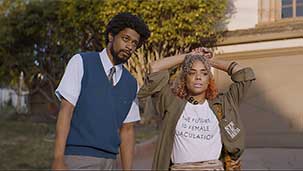Can you hear that? It’s the sound of panicked Hollywood execs rifling through scripts looking for the next breakout magical realist social commentary stoner comedy. But they won’t find it. It’s already been made, and it’s one of a kind.
Sorry to Bother You is from the mind of a filmmaker that comes along once in a generation. If we’re lucky. Boots Riley, the 47 year-old African American musician/activist behind this film, spent years working as a telemarketer while writing then pitching this script. Sorry to Bother You is set in an alternate-universe of present-day Oakland that satirizes, among other things, America’s current racial and socio-economic divide.
The conceit of the film is that the protagonist, Cassius Green, succeeds in his telemarketing job by employing a “white voice”. Not a “Will Smith white voice” as a veteran telemarketer explains, but the kind of “white voice” that implies not just race, but effortless success. You overdubbed David Cross to play Lakeith Stanfield’s white voice, but made his and all the other actors’ lip syncing purposely imprecise. We know these voices are dubbed, we can hear it, and see it. It’s an on-the-nose parody of the performative type of whiteness that even some white people aspire to, particularly as a response to racist tropes of blackness.
The slightly sloppy overdub is just one of many tricks Riley employs to give the film an overall sense of DIY-ness. It hints not just at the film’s indie budgeted restrictions, but at the slap-dash, gig-economy hustle that Cassius and his friends and community must participate in to stay afloat. In this meta-Oakland, Cassius sees ads for “Worry Free” – a utopian Amazon-esque company that offers workers uniforms, meals and accommodation in return for the “freedom” of never having to struggle to pay bills, shop, or find housing. Behind him on the news is coverage of the Worry Free employees protesting slave-like conditions. Detroit is a provocative performance artist who works as a sign-twirler before joining Cassius’s telemarketing company and participating in the wage-strike just as his white-voiced success sends him up the corporate ladder (or in this case, the golden elevator).
As a phenom Power Caller, Cassius quickly discovers the evil secret that makes Worry Free successful, garnering the attention of Worry Free CEO Steve Lyft (a Musk/Bezos caricature with a heavy dash of Tony Montana thrown in, played with peak rich-white-maleness by Armie Hammer). And yet, Cassius struggles with whether to quit something he’s finally good at, alienating his fiancé and friends, and contributing to the destruction of civilized society while making an obscene amount of money, or return to his uncle’s garage where he wallows in existential dread and poverty.
Sorry to Bother You is an absurdist, bubblegum-flavoured, dystopian fever-dream, but it is grounded in its central theme: is it better to be poor and retain your dignity and integrity, or to be rich and hate yourself? It bounces between genres – comedy, horror, psychological thriller, farce – and is unselfconsciously messy, but never scattered. Riley knows exactly what he’s doing, and had he been given a bigger budget, bigger stars, and a crack marketing team, Sorry to Bother You wouldn’t be nearly as biting, hilarious or painfully aware.
Sorry to Bother You wouldn’t have made as profound an impact had it come out ten or even five years ago. It’s unapologetically of the moment, and yet is a madcap, gonzo masterpiece that we will still be talking about in twenty-plus years. Like Jordan Peele (Get Out), Issa Rae (Insecure), and Donald Glover (Atlanta), Riley adds his bold voice to the vital and thought-provoking African-American media zeitgeist. And it’s a voice that needs no dubbing.
Not Sorry,
Di







